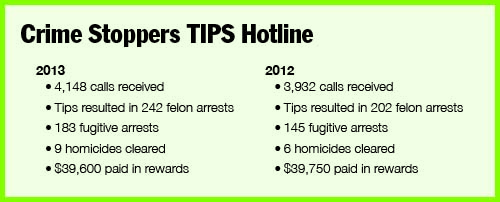By LESLIE COLLINS
Northeast News
February 19, 2014
When the Greater Kansas City Crime Stoppers TIPS Hotline launched in 1982, it received 30 tips which helped police clear eight crimes. In 2013, the TIPS Hotline received 4,148 calls that helped clear 300 criminal cases and resulted in the arrest of 242 individuals. A total of 609 homicide cases have been cleared since 1982 as a result of the program.
“This program has really done an unbelievable job,” President of the Kansas City Metropolitan Crime Commission Rick Easley told the city’s Public Safety and Emergency Services Committee Feb. 5. “The program has done so well, we get a lot of calls from organizations wanting to know how we do it.”
In 2013 alone, Kansas City Crime Stoppers gave out $39,600 in reward money for crucial crime tips. Beginning this year, it doubled the maximum award amount to $2,000.
Easley told Northeast News one of the aspects that has made the program so successful is that tips are accepted anonymously; rewards are also distributed using anonymity.
“People have a feeling of protection with that anonymity,” he said.
The crime commission also advertises the TIPS Hotline program on billboards, in local television commercials, on business cards and more. It also produces the Kansas City Crime Stoppers Most Wanted newspaper which is available in about 170 convenience stores.
“We play a supporting role for the police department,” he said. “They (police officers) take that tip and investigate it and see if it fills a void in the puzzle they’re investigating.”
Easley also updated the committee on other programs run by the Kansas City Metropolitan Crime Commission, like the community service program. Since its launch in 1994, the community service program has served more than 100,000 community service clients, Easley said. In 2013, the program saved the Kansas City metro area more than $1 million in labor costs. Projects have included park and neighborhood cleanups, among others. Ongoing cleanups have occurred along Truman Road and in Historic Northeast, he said. Those participating in the program have committed non-violent, minor offenses.

















